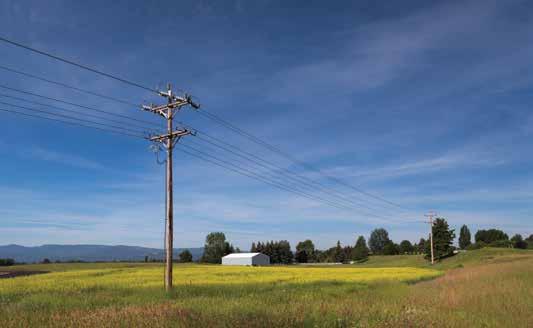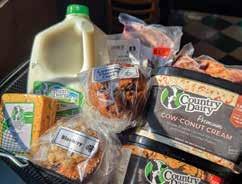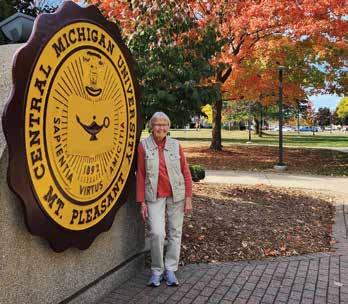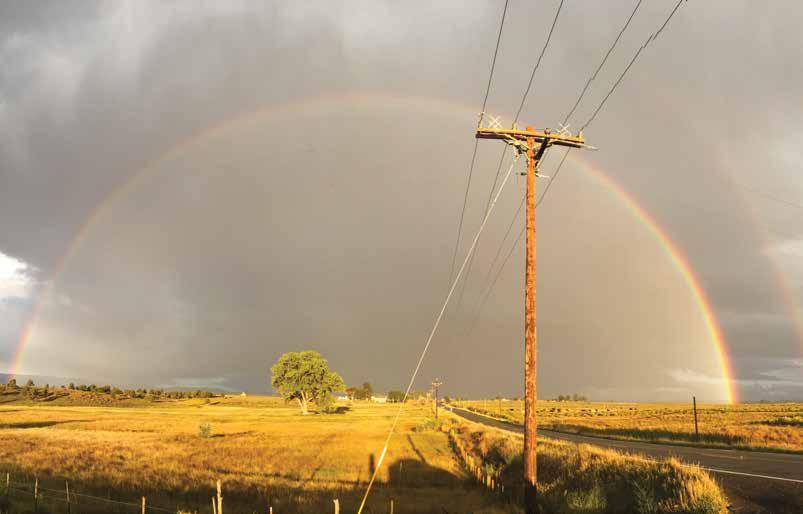

Sugar Starts MICHIGAN COUNTRY LINES
Michigan’s Rooted Success Story
Feeling is believing.


THE RELIABLE RENEWA BLE™
You may not see your underground WaterFurnace geothermal system. But you'll definitely notice its effects.
When it comes to your HVAC system, you primarily want to know whether it will comfortably heat and cool your home. With WaterFurnace, that answer is a resounding "yes." Our units operate for longer periods at lower speeds, providing stable temperatures all year round. This helps eliminate hot or cold spots, so you'll be comfortable in every room. Experience a WaterFurnace geothermal system in action, and you'll feel the difference.
Geothermal is the only renewable that provides reliable operation 24 hours a day, 7 days a week, 365 days a year.
-------YOUR LOCAL WATERFURNACE DEALERS
Allendale
Allendale Htg & Clg (800) 327-1937 allendaleheating.com
Berrien Springs
WaterFurnace Michiana (269) 473-5667 gogreenmichgeo thermal.com
Big Rapids
Stratz Htg & Clg, Inc. (231) 796-3717 stratzgeocomfort.com
Filion/Bad Axe
Air-0-Dynamic Htg & Clg (989) 582-0137 aod-hvac.com
Grand Rapids
Bel Aire Htg & Clg 1-888-235-2473 belaire.com
Hart
Adams Htg & Clg (231) 873-2665 adamsgeothermal-mi.com
Holland
G.H.P. Systems I n c. (616) 396-5833 ghpsystems-inc.com
lndlan River
M&M Plm b & Htg (231) 238-7201 mm-plum bing.com
Lansing Candor Mechanical (517) 920-0890 candorm echanical.com
Michigan Center
Comfort 1/Air Serv of Southern Michigan (517) 764 -1500 ai rser v.com/southernmichigan/
Mt. Pleasant
Walton Htg & Clg (989) 772-4822 waltonheating.com


Portage Bel Aire Htg & Clg 1-888-235-2473 belaire.com
Portland ESI Htg & Clg (517) 647-6906 esiheating.com
Sunfield Mark Woodman Plmb & Htg (517) 886-1138 mw phonline.com
Three Rivers
Bel Aire Htg & Clg 1-888-235-2473 belaire.com
Traverse City
Geofurnace Htg & Clg (231) 943-1000 geofurnace.com

--- CO-OP REBATE INCEN TIVES
Alger Delta Electric: up to $2,000
Cherryland Electric: up to $2,500
Cloverland: up to $6,275
Great Lakes Energy: up to $5,000
Homeworks/Tri-County Electric: up to $4,750
Presque Isle Electric & Gas Co•op: up to $4,750
Thumb Electric: up to $2,000


MICHIGAN COUNTRY LINES
EXECUTIVE EDITOR: Casey Clark
EDITOR: Christine Dorr
GRAPHIC DESIGNER: Karreen Bird
RECIPE EDITOR: Christin Russman
COPY EDITOR: Yvette Pecha
CONTRIBUTING EDITOR: Emily Haines Lloyd
PUBLISHER: Michigan Electric Cooperative Association
Michigan Country Lines, USPS591-710, is published monthly, except August and December, with periodicals postage paid at Lansing, Mich., and additional offices. It is the official publication of the Michigan Electric Cooperative Association, 201 Townsend St., Suite 900, Lansing, MI 48933.
Subscriptions are authorized for members of Alger Delta, Cherryland, Great Lakes, HomeWorks Tri-County, Midwest Energy & Communications, Ontonagon, Presque Isle, and Thumb electric cooperatives by their boards of directors.
POSTMASTER:
Send all UAA to CFS.
ASSOCIATION OFFICERS: Chris O’Neill, HomeWorks TriCounty Cooperative, chairman; Gabe Schneider, Cherryland Electric Cooperative, vice chairman; Shaun Lamp, Great Lakes Energy Cooperative, secretary-treasurer; John Kran, president and CEO.
CONTACT US/LETTERS TO EDITOR: Michigan Country Lines 201 Townsend St., Suite 900 Lansing, MI 48933 248-534-7358
editor@countrylines.com
CHANGE OF ADDRESS: Please notify your electric cooperative. See page 4 for contact information.
The appearance of advertising does not constitute an endorsement of the products or services advertised.
MICHIGAN’S ELECTRIC COOPERATIVES


MI CO-OP Community
RECIPE CONTEST
See details on page 10. VeggieLoaded Comfort Foods, due Nov. 1. Win a $100 bill credit!
GUEST COLUMN
See details on page 18. Share your fondest memories and stories. Win $200 for stories published!
MYSTERY PHOTO
See details on page 18. Win a $100 bill credit!
To enter contests, submit reader content & more, visit countrylines.com/community


6 SCULPTED BY NATURE, BUILT FOR ADVENTURE: SILVER LAKE SAND DUNES
Step into a paradise where sun, sand, and water come together.
10 MI CO-OP KITCHEN
Perfectly Potatoes: Comforting, crispy, creamy—discover delicious ways to enjoy this versatile favorite.
14 WHERE SUGAR STARTS: MICHIGAN’S ROOTED SUCCESS STORY
Michigan Sugar’s cooperative heritage showcases the sweet strength of community.
18 GUEST COLUMN
Little Teacher, Big Lesson: How a Homeworks member’s young grandson demonstrated the power of owning our mistakes.

500 J.K. Paul Street
Ontonagon, MI 49953
906-884-4151
800-562-7128
After hours: 866-639-6098
OFFICERS & DIRECTORS
Michael Gaunt, President Chassell/Keweenaw Bay District 906-370-8133 • district5@ontorea.com
William Hodges, Vice President Lake Linden District 906-934-3743 • district7@ontorea.com
Mildred Ann Gasperich, Secretary Boston District 906-337-5079 • district6@ontorea.com
Randy Myhren, Treasurer Green/Firesteel/Toivola District 906-884-4092 • district1@ontorea.com
Jack Lehto, Director Pelkie/Herman/Aura District 906-353-6684 • district3@ontorea.com
Calvin Koski, Director Aura District 906-524-6988 • district4@ontorea.com
Paul Koski, Director Ewen/Trout Creek/Lake Mine District district2@ontorea.com
PERSONNEL
Dallas Aho, CEO/General Manager
Alex Watson, Billing Clerk
Justin Sironen, Operations Manager Kelsey Preiss, Administrative Assistant
OTHER INFORMATION
Date of Incorporation: Sept. 30, 1937 Fiscal year-end: Dec. 31 countrylines.com/coops/ontonagon
Ontonagon County REA is an equal opportunity provider and employer.


What Makes Electric Cooperatives Different?
By Dallas Aho, General Manager
Electricity may flow through the same outlets no matter where you are in the U.S., but the companies delivering that power aren’t all alike. In fact, the type of electric utility that serves your home can make a big difference in how decisions are made, how much you pay, and how connected your utility is to your community.
Across the country, three types of organizations provide electricity: investorowned utilities (IOUs), public power systems, and electric cooperatives. IOUs serve about two-thirds of Americans and are typically large, for-profit corporations. Public power systems, owned by local governments, serve about 15%. Electric cooperatives—like ours—serve around 13%, primarily in rural and smaller communities.
What sets co-ops apart is simple: We’re not-for-profit, locally owned, and community focused.
Service Over Profit
Unlike IOUs, co-ops are not driven by shareholders or stock prices. Instead, our mission is to provide reliable, affordable power to our members—who also happen to be our owners. There are no profits funneled to outside investors. Any extra revenue is either reinvested into the system or returned to members as capital credits.
Local Control and Accountability
Co-ops are governed by a board of directors elected from among our members. These directors are your neighbors. They live in the same communities,
understand local needs, and make decisions based on what’s best for the membership—not for Wall Street.
If you have a question or concern about your service, you don’t have to track down someone at a far-away corporate office. You can speak directly with your local board or co-op staff—people who work and live where you do.
Serving Where Others Won’t
Most co-ops were founded because investor-owned utilities didn’t want to serve rural areas, where fewer homes per mile made building power lines less profitable. That’s still true today: Co-ops average only about 8 members per mile of line, compared to 32 for other utilities. That means more infrastructure to maintain with less revenue. Yet co-ops work hard to keep rates as low as possible while maintaining reliability.
Community Commitment
Electric cooperatives don’t just deliver power—they invest in their communities. From sponsoring local events to supporting economic development, co-ops are committed
to improving the quality of life where they serve. We provide jobs, pay taxes, and support local schools, nonprofits, and emergency services.
Working Together for Stronger Service
Another thing that sets co-ops apart is our commitment to cooperation. Through partnerships with other co-ops, we share resources, build joint projects like solar fields, and improve service reliability. This spirit of collaboration, guided by the Seven Cooperative Principles, ensures that co-ops remain innovative and resilient, no matter what challenges come our way.
Regulated, Responsible, Reliable
Like all electric utilities, co-ops are regulated by state and federal agencies, which oversee safety, reliability, and pricing. But what makes co-ops truly unique is our memberfirst mindset and our deep local roots.
When you’re part of an electric co-op, you’re not just a customer—you’re an owner, a voter, and a vital part of a community-powered organization.
Notice to Members of Ontonagon County Rural Electrification Association (OCREA) A Special Board Meeting Is Set for Sept. 22 at 9:30 a.m.
The board of directors will consider changes to the cooperative’s rates and tariffs at its special meeting on Sept. 22, 2025, to be held at the cooperative’s office at 500 J.K. Paul Street, Ontonagon, Michigan. The meeting will start at 9:30 a.m. and is open to all OCREA members.
The following items will be discussed:
1. The board will establish the 2026 Power Supply Cost Recovery Factor to be applied to the cooperative’s retail memberconsumers’ kilowatt-hour use. The Power Supply Cost Recovery (PSCR) Factor represents the power supply costs as established by the cooperative in conjunction with Wolverine Power Cooperative. The factor is established annually and reviewed monthly; and
2. Consideration of revisions to the cooperative’s Energy Waste Reduction (EWR) surcharge.
Notices of changes or additions to the cooperative’s rates or service rules shall be sent to all members, as required by P.A. 167, by first-class mail or by publication in Michigan Country Lines at least 30 days prior to their effective date.
Participation: Any interested member may participate and should contact OCREA at 906-884-4151 a week in advance to request information. Comments may also be made before the meeting date by emailing CEO Dallas Aho at daho@ontorea.com
Notice to Members of Ontonagon County REA Case No. U-16595 2024 Renewable Energy Plan Annual Report Summary
Michigan law requires all Michigan electric utilities to get at least 15% of their power supply from renewable sources during 2024.
Under this requirement, Ontonagon County REA submits an annual report to the MPSC regarding its Renewable Energy Plan. In 2024, Ontonagon County REA acquired a total of 3,897 renewable energy credits. Ontonagon County REA will continue to acquire renewable energy and bank unused renewable energy credits for future use and compliance with statutory renewable portfolio standard requirements on behalf of all of its members.
A full copy of the cooperative’s Renewable Energy Plan annual report that was filed with the MPSC is available on the cooperative’s website at ontonagon.coop or by request at any of the cooperative’s offices.

Exploring Silver Lake Sand Dunes
Along the eastern shores of Lake Michigan lies an oasis in Oceana County where stunning sand dunes meet sparkling serene waters. The unique landscape of Silver Lake Sand Dunes keeps visitors returning year after year. Thrill seekers, families, and nature lovers are drawn to Silver Lake Sand Dunes for the exhilarating adventures and captivating beauty.
From scaling giant sand dunes to cruising the waterways and soaking in the sunsets, this premier recreational destination has so much to explore.
Silver Lake State Park
The park encompasses over 2,000 acres of sand dunes. It’s situated on both Lake Michigan and Silver Lake, creating a sanctuary for swimming, sailing, sunbathing, and fishing. Silver Lake State Park also boasts three miles of Lake Michigan shoreline, a modern campground with a day-use area, and a boat access site. However, the park’s most distinctive feature is its 450-acre Silver Lake off-road vehicle (ORV) area, operating from April 1 through Oct. 31. Silver Lake Sand Dunes is the only place east of the Mississippi River where visitors can drive private motorized vehicles across the sand dunes. Bring your own 4x4 or ATV/UTV, or rent one from a local outfitter, and enjoy one of nature’s greatest playgrounds.

Mac Wood’s Dune Rides
629 N. 18th Ave., Mears, MI 49436
For those seeking a thrilling guided experience, Mac Wood’s Dune Rides offers a one-of-a kind, 7-mile dune buggy ride through the dunes. A family tradition established in 1930, this 40-minute interpretive tour provides insights into the area’s history and ecology. Take a quick break at Lake Michigan before traversing the tallest dunes on Silver Lake. Mac Wood’s buggy tours are seasonally available on a walk-in basis—no presale tickets or reservations are needed.

Little Sable Point Lighthouse
287 N. Lighthouse Dr., Mears, MI 49436
Standing sentinel over the dunes is the spectacular Little Sable Lighthouse, clocking in at 115 feet tall. Built in 1874, its distinctive red brick construction is a testament to the region’s maritime heritage. During summer and fall, visitors can climb the tower for panoramic views of Lake Michigan and the surrounding landscape.
Photo by Shannon Priebe

Cherry Point Lavender Farm & Market
9600 W. Buchanan Road, Shelby, MI USA 49455
Cherry Point Lavender Farm & Market is one of the oldest operating farms in Oceana County, opened in 1949. Come to absorb the aromas or sniff your way through the labyrinth and herb garden. Gardens are open to the public daily during business hours May 2 through Oct. 31, and there is no cost to enter. Lavender is typically in season from mid- to late July. Visit the market to pick up souvenirs, gifts, jams, jellies, and homegrown baked goods made with orchard-fresh produce.

Lewis Adventure Farm & Zoo
4180 West M-20, New Era, MI 49446
Lewis Adventure Farm & Zoo is a fifth-generation family fruit farm, corn maze, and petting zoo with over 46 attractions. Here, the excitement never ends—meet exotic animals, ride the giant slide, or cool off at the Splash Acres spray park. Lewis Adventure Farm & Zoo is a haven for food lovers, offering everything from savory delights to tasty sweets that are sure to satisfy your craving. Be sure to stop by the bakery for fresh pies, breads, and other goodies. Reserve an Animal Encounter for an up-close experience to feed and learn all about sloths, lemurs, and kangaroos. Fall season on the farm offi cially begins Sept. 5 with the pictureperfect pumpkin house and other seasonal activities. U-pick produce is available mid-September through October.

Country Dairy Farm Store, Deli & Visitor Center
3476 S. 80th Ave., New Era, MI 49446
Country Dairy began in the 1880s when Andrew Van Gunst came from the Netherlands to West Michigan. Now into its fourth generation, Country Dairy employs around 125 people who milk over 1,000 cows, process milk, and make cheese, ice cream, and butter. The Farm Store is a favorite destination for tourists and guests from all over the world. Come inside to dine, enjoy unlimited refills on chocolate milk, and shop for gifts, meats, baked goods, and more.
Step into a paradise where sun, sand, and water come together at Silver Lake Sand Dunes. Wowing visitors with its natural wonder and dynamic landscape, you’re promised an unforgettable adventure.
Scan the QR code to watch a video of Cassondra’s adventure to Silver Lakes Sand Dunes

Cassondra Scott is a content creator, writer, and social media influencer at Cassondra Wanders—sharing small businesses and sights to see all over the state of Michigan.
/cassondrawanders /cassondra.wanders @cassondrawanders @cassondrawanders

Out of Sight, Out of Mind: Finding Hidden Energy Savings at Home
It’s easy to overlook the hidden energy users in our homes. But every plugged-in device and always-ready appliance can quietly add to your electric bill. The good news? With a few small adjustments, you can uncover hidden savings and reduce unnecessary energy use.
Water Heater Settings Matter
Your water heater may be using more energy than it needs. Most models are preset at 140 degrees, but that’s more than necessary for most households. The U.S. Department of Energy recommends setting your water heater to 120 degrees. This not only saves energy but also lowers the risk of scalding. Just don’t go lower than 120 to avoid bacterial growth in the tank.
Lighting: Nightly Usage Adds Up
Exterior security, porch, and barn lights can run every night— adding up to over 4,000 hours a year. If they use outdated bulbs, that’s a lot of wasted energy. Upgrade to LED bulbs, which last longer and use significantly less power. Even better, consider motion sensor or dusk-to-dawn lighting so lights only come on when needed.
Pools and Hot Tubs: Energy Guzzlers
Out of sight and often out of mind, pool pumps and hot tub heaters can quietly use a lot of electricity. ENERGY STAR®certified pool pumps can be programmed to run at lower speeds and meet your pool’s specific filtering needs, saving both energy and money. Hot tubs can be scheduled to maintain a lower temperature when not in use. If your utility offers time-of-use rates, consider scheduling pump and heater usage during off-peak hours.
Tame the Plug Load
“Plug load” refers to everything in your home that’s plugged into an outlet—TVs, chargers, computers, coffee makers, and more. If a device isn’t in use, unplug it. For convenience, use smart power strips for computer stations or entertainment centers. These strips automatically turn off peripherals when the main device (like a TV or computer) powers down, cutting unnecessary power use.
Gaming Consoles: Still Using Energy in Rest Mode
Gaming consoles are another often-overlooked energy user. Many remain in standby or rest mode to allow for quick updates or fast startup. But they’re still drawing power. Ask the gamers in your household to power off completely between sessions. It may take a bit longer to load, but the energy savings add up.
Take Action and Ask About Rebates
Once you start identifying the silent energy users in your home, it’s easier to build habits around powering down and unplugging. When it’s time to upgrade equipment or appliances, contact your electric utility to ask about available rebates or energy-saving programs.
Energy savings often start with small, intentional choices. A few simple changes today can lead to meaningful reductions in your monthly bill—and a more energy-efficient home for the long run.
COLLEGE TOWNS




Sunset at Portage Canal, MTU campus. Beth
3.
4.
Maatta
GREEK ROASTED POTATOES
Karen Stephens, Great Lakes Energy
5 pounds russet potatoes, washed and peeled
1 lemon (zest and juice)
¼ cup melted butter
¼ cup olive oil
1½ teaspoons salt
1 teaspoon dried oregano
1 teaspoon garlic powder
½ teaspoon freshly ground black pepper
½ teaspoon paprika, plus additional for sprinkling
1½ cups chicken broth
¼ cup chopped fresh parsley, optional
Preheat oven to 375 F. Cut peeled potatoes in half lengthwise and cut halves into smaller pieces. Place potatoes in a large bowl. Zest and juice the lemon and add both over the potatoes. Add the melted butter, oil, salt, oregano, garlic powder, black pepper, and paprika. Stir to coat. Transfer the potatoes to a 9x13-inch baking pan. Slowly pour the chicken broth into the pan (note: don’t pour directly over the potatoes or all the spices will be removed). Dust potatoes with additional paprika, if desired. Cover the pan tightly with aluminum foil. Bake for 40 minutes, then remove the foil and bake for an additional 40 minutes or until potatoes are tender. Remove from oven and cover again with foil; let rest for 15 minutes (this helps the potatoes soak up more of the spices). Remove the foil and sprinkle with fresh parsley.

Veggie-Loaded




DILL PICKLE POTATO SALAD
Luise Bolleber, Cherryland Electric Cooperative
2 pounds Yukon gold potatoes
½ cup mayonnaise
¼ cup sour cream
1 tablespoon spicy brown mustard
¼ cup dill pickle juice
¼ cup fresh chives, chopped
2 tablespoons fresh dill, chopped (or 1 teaspoon dried dill)
¼ teaspoon salt
¹⁄8 teaspoon freshly ground black pepper
¹⁄3 cup red onion, fi nely chopped
1 stalk celery, thinly sliced
½ cup dill pickles, chopped
2 hard-boiled eggs, chopped
Boil the potatoes in salted water until fork tender. Drain and let cool. Peel off the skins and cut into cubes. In a large bowl, add the mayo, sour cream, mustard, pickle juice, chives, dill, salt, and black pepper. Combine. Add the cubed potatoes, red onion, celery, pickles, and eggs. Toss gently to combine. Taste and add more salt, pepper, or pickle juice, if desired. Refrigerate for 1 hour before serving.
NENE’S POTATO SOUP
Jodi Drogowski, Great Lakes Energy
3 medium potatoes, peeled and cubed
2 cups water
3 tablespoons butter
1 small onion, peeled and diced
3 tablespoons fl our ¼ teaspoon freshly ground black pepper
¹⁄8 teaspoon (or less) cayenne pepper
2 cups milk
3 tablespoons sugar
1 cup cheddar cheese, shredded
1 cup bacon, cooked and crumbled
In a large pot, boil the cubed potatoes in 2 cups water for approximately 10 minutes (until tender but not soft). Drain potatoes, reserving liquid. Set potatoes and reserved liquid aside. Melt butter in saucepan over medium heat. Sauté diced onion in butter until translucent and tender (but not brown). Add fl our to saucepan. Season with black pepper and cayenne pepper. Add 1 cup reserved liquid into saucepan, stirring continuously. Add milk to saucepan; stir until slightly thickened. Add boiled potatoes and sugar to saucepan. Add cheese and bacon to saucepan. Simmer over low heat for 30 minutes, stirring frequently. Serve warm (with homemade rolls and butter!).
ROSTI WITH BAKED EGGS
Vicky Hueter, Great Lakes Energy
1¼ cups Greek yogurt
2 tablespoons fl our
1½ cups peeled, grated turnips
1¼ cups shredded Gruyère cheese
¹⁄3 cup butter, melted
¼ cup chives, chopped (plus more for garnishing)
1¼ teaspoons salt
½ teaspoon freshly ground black pepper
¼ teaspoon nutmeg
1 (30-ounce) package
frozen shredded hash browns, thawed
8 large eggs
• cooking spray
Preheat oven to 400 F. Coat a 9x13-inch baking pan with cooking spray. In a large bowl, combine yogurt and fl our; stir well. Add turnips, Gruyère cheese, butter, chives, salt, black pepper, nutmeg, and hash browns. Stir until combined. Spread mixture evenly in the 9x13-inch baking dish. Bake for 30 minutes. Remove from oven and make 8 indentations with the back of a spoon. Crack an egg into each and return to oven for 8–10 minutes until egg whites are fi rm and yolks barely move when touched. Garnish with additional chives and black pepper. Serves 8.
YOU’RE PART OF A LARGER POWER GRID
Every time you charge your phone, you’re connecting to more than just an outlet—you’re plugging into a complex power grid.
The Interconnected Power Grid
Thumb Electric Cooperative is part of a network that extends from Canada to Louisiana, connecting various power generators and high-voltage transmission companies.
How Being Connected Impacts You
The connected grid works great as long as there is enough supply to meet demand. In recent years, utilities have faced increasing pressure to retire coal plants faster than they can replace them, resulting in a reduction of power supply reserves.
WE SHARE POWER
Being connected allows regions to share power and send it to where it’s needed most. This provides you with enhanced reliability and reduced energy costs.
WE SHARE RISK
If one part of the region has an electricity shortage, it can spread through the connected grid like a contagious illness.
WE SHARE RESPONSIBILITY
Even though Thumb Electric Cooperative has more than enough power to meet your needs, during a grid shortage, rules can require us to participate in rolling blackouts or ask you to conserve energy.
So, the next time you switch on a light or plug in your gadgets, remember that you’re plugging into a network of collaboration.
Power of Co-op Communities: From the REA to Today— the Enduring Power of Connection
By Emily Haines Lloyd
When the Rural Electrification Act (REA) passed in 1936, it did more than bring electric lines to farms—it powered a movement. Built by neighbors for neighbors, electric cooperatives transformed rural life. Nearly 90 years later, that same spirit continues to connect Michigan’s rural communities—not just with electricity, but with tools for resilience, innovation, and opportunity.
This October, during National Cooperative Month, we’re reminded that co-ops are more than utilities—we are community builders. Michigan’s electric cooperatives honor that legacy by ensuring electric reliability and staying rooted in the values that built us: service, commitment, and cooperation.
Electric Reliability: Powering Rural Progress
Keeping the lights on in rural Michigan requires long-term planning and reliable generation. That’s why electric co-ops are investing in system upgrades, new energy resources, and smart technology to meet growing demand and withstand increasingly severe weather.
“Just like we brought power to the countryside nearly a century ago, co-ops are now bringing new and exciting energy options to the places that need it most,” said MECA CEO & President John Kran. “It’s not just about connection—it’s about unlocking potential in every rural home, farm, and business.”
Cooperatives ensure members have the dependable, affordable power they need—whether through traditional sources or renewable projects like solar, wind, and peaking plants. Reliability is the foundation of everything we do, because when the power stays on, rural communities can thrive.
Democracy in Action: A Voice for Every Member
One of the most powerful aspects of the co-op model is that it’s not just a service—it’s a partnership. Co-ops are owned by the members they serve. That means you have a voice in how your co-op is run.
Every member has the right to vote for their board of directors, who set policy and guide decision-making. Even better? Members can run for the board themselves. It’s a grassroots, democratic process that ensures our direction is always grounded in the needs of the community—not outside investors.
Participation is at the heart of the cooperative difference. From attending your annual meeting to serving on the board, your voice helps shape the future of your electric cooperative.
The Power of Community
Electric cooperatives are neighbors, partners, and problemsolvers. Every decision we make starts with a simple question: What’s best for our members? That’s why we invest in schools, support scholarships, advocate for rural issues, and work 24/7 to restore power in any conditions.
“Electric co-ops were founded on the idea that we’re stronger together. Every pole we set, every line we run, every investment we make—it all comes back to serving people, not profits,” said Kran. “That’s the power of community.”
Part of a National Network
Michigan co-ops are not alone. We’re part of a national network of 942 electric cooperatives serving more than 42 million people across 56% of the landmass of the United States. That shared strength gives us access to resources, knowledge, and collaboration that help us better serve our nationwide communities—while still maintaining local control.
Where Sugar Starts ↓

MICHIGAN’S ROOTED SUCCESS STORY
Grower-owned, community-driven, and deeply Michigan.
By Emily Haines Lloyd
In Michigan, the cooperative spirit runs deep—whether it’s powering homes or planting sugar beets, co-ops have brought people together around shared goals, mutual investment, and local leadership.
Headquartered in Bay City and founded in 1906, Michigan Sugar is the third-largest sugar beet producer in the United States, producing the well-known Pioneer Sugar brand. Today, the company includes about 865 grower-owners cultivating sugar beets on roughly 140,000 acres across 20 counties in Michigan and Ontario.
Unlike traditional corporations, Michigan Sugar—and electric co-ops around the state—operates with a peoplefi rst model. The growers and members are also the owners, with decision-making power and a shared stake in the outcome. It’s a system that keeps profi ts local, encourages innovation, and builds long-term value for communities. Michigan Sugar alone supports more than 1,000 full-time and 1,100 seasonal jobs and produces 1.3 billion pounds of sugar annually.
Few stories illustrate that better than the partnership between Michigan Sugar Company and the farming families who own it—families like the Briolats, who grow sugar beets as well as help govern rural electric policy.
“Being a part of two co-ops really shows you how similar the values are,” said Mike Briolat, who manages Briolat Farms alongside his brother, Steve, and son, Justin.“You’re making decisions for the long term, weighing investments, asking who’s tried what, and what worked. It’s all about making things better for your members and your community.”
While the Briolats have farmed for over 75 years on their land, sugar beets were a relatively new crop to them in the mid-80s. What started with planting 100 acres of sugar beets has turned into around 450 acres and harvesting 30 to 34 tons per acre—well beyond what they could have imagined back then.
The family’s connection to Michigan Sugar deepened in 2002, when the company offi cially became a grower-owned

co-op. At the same time, Mike’s father, Leonard, served on the Thumb Electric Cooperative Board of Directors— a legacy Mike would continue. He has followed his father’s footsteps on both the farm and in TEC’s boardroom for Sanilac County’s District 2.
The Briolats have remained passionate about keeping those boards—like the land—growing and evolving. Staying open to change, while also honoring tradition, is another common thread amongst co-ops.
“You want fresh ideas in the field, and you need them in the boardroom too,” Briolat said. “And I am encouraged by some younger folks stepping up, bringing different perspectives. It’s good for the board, and it’s better for the members.”
Michigan Sugar continues to invest in grower programs, sustainability, and innovation to ensure the cooperative model stays strong—but its greatest strength is its people. Families like the Briolats bring not only generations of experience but dedication, know-how, and shared purpose to every acre.
“It’s not just about growing sugar beets,” Briolat said. “Cooperatives are about rolling up your sleeves and pitching in—supporting your neighbors, building a future for the next generation, and doing your part for the community.”


“BEING A PART OF TWO CO-OPS REALLY SHOWS YOU HOW SIMILAR THE VALUES ARE. IT’S ALL ABOUT MAKING THINGS BETTER FOR YOUR MEMBERS AND YOUR COMMUNITY.”
Pictured from left to right are Steve, Leonard, Mike and Justin Briolat
2025 Annual Meeting Highlights

The Ontonagon County Rural Electrification Association (OCREA) held its Annual Meeting on Saturday, June 21, at Chassell High School. Members from the co-op’s sevendistrict service area attended the event, which featured election results, reports from the co-op staff, a discussion of old and new business, prize drawings and lunch.
Board President William Hodges began the meeting by welcoming everyone and introducing the members of the board as well as the other REA representatives that were present at the meeting.
Secretary Ann Gasperich announced that there was no need for an election committee since the district 1, district 3, and district 5 directors ran unopposed this year. Randy Myhren, the incumbent for district 1 (Green/Firesteel/Toivola), Jack Lehto, the incumbent for district 3 (Pelkie/Harman/Aura) and Mike Gaunt, the incumbent for district 5 (Chassell/Keweenaw Bay) will retain their seats until the 2028 election.
Vice Chair Calvin Koski reported there are 54 members present, and an additional 16 proxy votes. A quorum was attained by the 54 in person, and the additional proxy votes, 16.
Chair Hodges spoke to the main purpose of the Annual Meeting is to provide important information to the members, and stated there are several reports to be presented. He called on CEO Dallas Aho to provide the financial report. Ontonagon REA continues to be examined by an independent auditing firm. CEO Aho then asked Operations Manager, Justin Sironen provided an update on the operations of the cooperative. Jack Lehto provided an update to the net metering policy.
Presentations were made by:
• Diana Torola, OREA, Youth Tour Winner
• John Kran, President of Michigan Electric Cooperative Association, (MECA)
• Tom Sobeck, Retired CFO & CEO of Presque Isle Electric and Gas, Ontonagon REA Consultant
The meeting concluded with a prize drawing and a luncheon prepared by the Keweenaw Coop.

2025 Annual Election of Officers
President: Mike Gaunt – Chassell/Keweenaw Bay District
Vice President: William Hodges – Lake Linden District
Secretary: Mildred Ann Gasperich – Boston District
Treasurer: Randy Myhren – Green/Firesteel/Toivola District
Paul Koski – Ewen/Trout Creek/Lake Mine District
Calvin Koski – Aura District
Jack Lehto – Pelkie/Harman/Aura

Harvest Season Safety: Stay Alert Around Power Lines
Farming has come a long way with GPS and auto-guidance systems, but it’s still one of the most dangerous jobs. During the busy harvest season, it’s easy to overlook everyday hazards—especially power lines.
Stay Aware— Every Direction
Large equipment with tall extensions like augers and grain trucks can easily come into contact with overhead power lines. Even with auto-steering, farm workers must stay alert and ready to act. Plan safe equipment routes and always be aware of what’s around, above, and below you.
Don’t forget other hazards like underground lines, extension cords, and defective wiring. Grain bins also require special attention—power lines must be at least 18 feet above the highest point of any bin used with portable equipment. If you’re unsure about the safety of power lines near your bins, contact your electric co-op.
Tips for a Safer Harvest
Follow these tips from SafeElectricity.org to reduce the risk of electrical accidents:
• WATCH FOR POWER LINES. Be extra cautious when raising augers or grain truck beds near them.
• USE A SPOTTER. Have someone guide you when operating large machinery near lines—but they should never touch the equipment while it’s moving.
• LOWER EXTENSIONS BEFORE TRANSPORT. Keep ladders, augers, poles, and rods down to avoid contact.
• STAY GROUNDED. Never try to move or raise a power line—call the utility.
• AVOID METAL TOOLS INSIDE BINS. Metal conducts electricity, especially when damp.
• HIRE QUALIFIED ELECTRICIANS. Only trained professionals should work on your farm’s electrical systems.
• IF EQUIPMENT TOUCHES A POWER LINE, STAY INSIDE UNLESS THERE’S A FIRE. If you must exit, jump clear with both feet together and hop away without touching the machine and ground at the same time.
• YOUR ELECTRIC COOPERATIVE CARES ABOUT YOUR SAFETY. With proper awareness and precautions, you can help ensure a safe and productive harvest season.
Where In Michigan Is This?

Little Teacher, Big Lesson
When my grandson apologized, he reminded me how powerful it is to own our mistakes.
Anna Moore
Bradfield, a HomeWorks Tri-County Cooperative member

Isn’t it amazing when kids teach you something you already know but haven’t bothered to practice? My 3-year-old grandson Lincoln schooled me recently. You would have thought Mickey and Minnie Mouse had entered when my husband John and I popped in to see our daughter’s family. The kids went nuts, cracking up, dancing around us, and throwing their arms around our necks.

MYSTERY PHOTO
Win a $100 energy bill credit!
Identify the correct location of the photo above by Sept. 25 and be entered into a drawing to win a $100 electric bill credit. Enter your guess at countrylines.com/community

JULY/AUGUST 2025 WINNER!
Our Mystery Photo winner is Melissa McGuire, a Midwest Energy & Communications member who correctly identified the photo as the Applecore Cottage in Charlevoix, Michigan.
Winners are announced in the following issues of Country Lines: January, March, May, July/August, September, and November/December.
After the initial rush, Lincoln asked John, “Big Poppy, can I use your phone?” This boy knows more about technology than I ever will. His Big Poppy said, “All right, but don’t download games. When Big Poppy asks for the phone, give it back, OK?” Of course, it was “OK” then. It would be hours before Big Poppy asked for the phone again. Lincoln toddled off, happy to reconnect with his best techno friends, Angry Birds.
Before Lincoln knew it and way before he was ready, Big Poppy said he needed his phone back since we were leaving. Keys in hand, I drew breath to ask where Lincoln was when I spotted his toes peeking out from under a blanket that blended seamlessly with the sofa. He had pulled the throw over himself, thinking he’d made himself invisible. If no one found him, he could keep the phone. Darned if those little piggies didn’t give him
away. We couldn’t leave without the phone. As we pulled the blanket up, Lincoln instantly morphed from his adorable, well-mannered, curlyheaded self to a bat-shrieking, monkey-clinging monster whose very existence depended on retaining that phone. His mom took charge. “See ya. Thanks for stopping by,” she said, as she dragged Lincoln out of the room.
We had barely settled into the car when John’s phone rang. “Hi, Big Poppy, this is Lincoln.” John grinned. “Hi, Lincoln.” “I’m sorry for crying when you asked for your phone. I shouldn’t have given you sass. I won’t do it again, Big Poppy.”
Such precious transparency:
1. Realize you messed up.
2. Admit it.
3. Apologize sincerely.
4. Don’t waste time doing it.
How well would it serve us all if we could harness this little habit?
GUEST COLUMN Win $200 for stories published! Share your fondest memories and stories. Win $200 for stories published. Visit countrylines.com/community to submit.








OCTOBER IS NATIONAL
CO-OP MONTH

Electric cooperatives are not-for-profit, community-led utilities. Because we are a co-op, we can adapt to our local members’ needs, providing the programs and services you care about most.
That’s the power of co-op membership.
